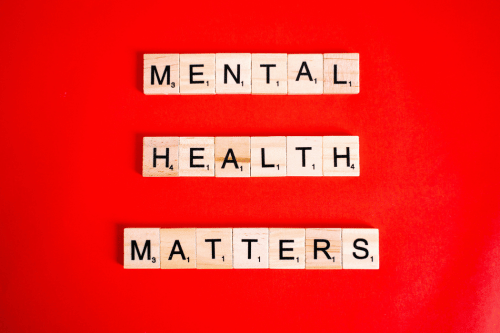Top Strategies to Achieve the Aim of Mental Health
The aim of mental health is about empowering individuals to handle stress, realize their potential, and live fulfilling lives. In this article, we’ll discuss essential strategies like early intervention, community support, and more to help you achieve mental well-being.
Key Takeaways
Understanding and setting mental health goals enhances resilience, emotional growth, and coping skills, fostering overall well-being.
Early intervention, community support systems, and access to quality services are critical components for effective mental health management.
Education and advocacy play vital roles in reducing stigma and improving access to mental health care, promoting a more inclusive society.
Understanding the Aim of Mental Health

Mental health refers to a state of mental well-being that enables individuals to cope with life’s stresses and realize their potential. It encompasses a variety of conditions, including mental disorders, mental illness, and psychosocial disabilities, each impacting individuals differently along the mental health continuum. Recognizing these diverse conditions helps in setting and achieving mental health goals, as well as maintaining physical health.
Setting mental health goals provides direction and purpose, enhancing emotional growth and fostering resilience. This process encourages self-reflection, helping individuals better understand their emotions and needs. Understanding challenges and developing strategies to overcome them is key to building coping skills and maintaining mental well-being.
Enhanced education about mental health fosters better understanding and acceptance, leading to a supportive community. Educational initiatives significantly improve mental health awareness and decrease stigma, particularly among students. By promoting empathy and reducing stigma, these initiatives pave the way for a more inclusive society.
Key Components of Mental Health Goals
Creating mental health goals is an empowering and insightful process. Key components include early intervention and prevention, community support systems, and access to quality services. These components play a vital role in addressing mental health challenges and promoting overall well-being.
Early Intervention and Prevention
Identifying mental health issues early in childhood is crucial for mitigating long-term impacts on child health. Incorporating mental health topics into school curriculums supports early intervention and normalizes conversations about mental health among students. Addressing mental health early fosters healthy behaviors and prevents more severe problems later in life.
Early intervention strategies involve not only identifying issues but also providing necessary support and resources. This approach includes educating parents, teachers, and children about mental health, ensuring that early signs are not overlooked.
Schools can play a pivotal role in this by integrating youth mental health education into their programs, thus creating a foundation for lifelong mental well-being.
Community Support Systems
Community mental health centers offer accessible services that are often more effective than traditional institutional care. These centers provide a range of services, including therapy, medication management, and support groups. Support groups, in particular, offer community and understanding for individuals coping with PTSD and other mental health challenges.
Effective treatment for PTSD often includes a combination of therapy, medication, and support from family and community. These community support systems are vital for recovery, providing a network of care that extends beyond the clinical setting. Fostering a sense of belonging and support, community mental health centers significantly improve mental health outcomes.
Access to Quality Services
Advocacy plays a crucial role in influencing legislation that prioritizes mental health funding and promotes inclusive policies. Mental health advocacy aims to influence public policies to enhance access to care and support for those facing mental health challenges. Global mental health initiatives emphasize the need for integrated care approaches to enhance access to mental health services in various countries.
The WHO’s Mental Health Action Plan emphasizes the need for universal health coverage and aims to provide quality mental health care to millions of people worldwide. Advocating for improved access to quality services ensures everyone receives the support needed for better mental health.
Strategies to Improve Mental Health

Improving mental health requires a multifaceted approach. Strategies include promoting healthy behaviors, building resilience and coping skills, and enhancing social connections. These strategies help individuals manage mental health challenges and improve their overall well-being.
Promoting Healthy Behaviors
Regular physical activity is an effective way to reduce stress and enhance mood in those suffering from anxiety disorders. Exercise is as effective as medication for treating depression, boosting mood-enhancing chemicals in the brain. Engaging in regular physical activity is crucial for enhancing mental health.
A diet rich in fruits, vegetables, and whole grains can potentially lower anxiety levels. Lifestyle modifications such as regular exercise and a balanced diet can significantly alleviate symptoms of depression. Therapy combined with lifestyle changes has shown significant improvements in managing depression.
Building Resilience and Coping Skills
Developing coping skills is essential for effectively managing stress. Support systems, including peer support groups, can enhance coping mechanisms for those affected by PTSD. These groups provide a safe space for individuals to share experiences and strategies for managing their mental health.
Resilience is not just about bouncing back from adversity but also about learning and growing from these experiences. By developing resilience, individuals can better navigate life’s challenges and maintain their mental well-being. Support systems play a crucial role in this process, offering encouragement and a sense of community.
Enhancing Social Connections
Building strong relationships can significantly improve mental well-being. Social support is crucial, as maintaining strong connections can significantly reduce the risk of depression. Identifying and connecting with individuals or groups for emotional support is essential during difficult times.
Seeking support provides encouragement and accountability, which are vital for coping with stress. By enhancing social connections, individuals can foster a sense of belonging and reduce feelings of isolation. These connections are vital for maintaining mental health and building a supportive network.
Addressing Specific Mental Health Challenges

Addressing specific mental health challenges requires targeted approaches. This section will explore managing anxiety disorders, combating depression, and dealing with PTSD, providing strategies and insights for each.
Managing Anxiety Disorders
Effective management of anxiety can involve understanding the disorder, practicing mindfulness, and applying relaxation techniques. Cognitive therapy and exposure therapy are recognized approaches for addressing anxiety disorders. Utilizing progressive muscle relaxation can be effective in alleviating anxiety.
Recognizing specific triggers that heighten anxiety helps individuals prepare coping strategies in advance. By understanding and managing these triggers, individuals can reduce the impact of anxiety on their daily lives. Techniques like progressive muscle relaxation and mindfulness can provide immediate relief and long-term benefits.
Combating Depression
Therapeutic interventions like cognitive behavioral therapy can provide strategies to manage depression effectively. Therapy and medication are commonly recommended treatments for managing depression. Combining therapy, medication, and lifestyle changes can enhance the effectiveness of treatment for depression.
Effective treatment for depression is essential as it helps individuals manage their symptoms and improve their quality of life. A holistic approach to depression helps individuals find relief and regain control over their mental health.
Dealing with Post-Traumatic Stress Disorder
Post-Traumatic Stress Disorder (PTSD) significantly affects individuals’ mental health and quality of life, necessitating effective treatment and support systems. Exposure therapy is an effective approach for helping individuals confront and manage memories associated with traumatic events.
Support systems are essential for PTSD recovery, providing a network of care that extends beyond clinical settings. By combining therapy with robust support systems, individuals with PTSD can achieve better mental health outcomes.
The Role of Education and Awareness

Education and awareness are crucial in fostering an understanding of mental health issues. These efforts can significantly advance the goals of mental health by promoting understanding and reducing stigma.
This section will explore the role of mental health education programs, reducing stigma, and advocacy and policy change.
Mental Health Education Programs
Mental health educational initiatives equip individuals with tools to recognize signs of issues and offer appropriate support. Programs focused on mental health education can equip individuals with the knowledge to recognize and address mental health challenges. These educational efforts enhance understanding and can lead to better outcomes for individuals experiencing mental health issues.
Global mental health initiatives aim to improve awareness, access to care, and treatment options worldwide. Implementing these programs helps communities create a supportive environment for those facing mental health challenges.
Reducing Stigma
Education and awareness programs can significantly shift public perceptions about mental health issues, leading to reduced stigma. Effective strategies include community workshops, school curricula focused on mental health, and campaigns promoting open conversations about mental health. Advocacy plays a vital role in changing policies and practice, raising awareness, and ensuring mental health is prioritized in public discourse.
Continuous efforts are vital in combating stigma and fostering a supportive environment for individuals with mental health conditions. Promoting continuous understanding and acceptance helps create a more inclusive society for everyone.
Advocacy and Policy Change
Countries globally are increasingly adopting comprehensive mental health policies that aim to integrate mental health into overall health services. Advocacy plays a crucial role in influencing policymakers to prioritize mental health needs. These policies significantly enhance the accessibility and quality of mental health care provided to populations.
Ongoing advocacy is essential for the continuous evolution and improvement of mental health policies. By advocating for policy changes, we can ensure that mental health remains a priority in public health agendas.
Global Perspectives on Mental Health

Mental health plays a vital role in personal development. It is also essential for the development of communities and the economy. Different countries employ varied strategies to address mental health issues, influenced by cultural, economic, and social factors.
This section will explore the WHO’s Mental Health Action Plan and international collaboration.
WHO’s Mental Health Action Plan
The WHO’s Mental Health Action Plan 2013-2030 emphasizes the need for integrated mental health services within community settings. One of the key goals of the WHO’s action plan is to enhance governance and leadership in mental health systems globally. This action plan aims to provide quality mental health care to millions of people worldwide, highlighting the importance of universal health coverage.
Integrating mental health services into community settings aims to make care more accessible and effective, as outlined in the WHO’s plan.
International Collaboration
Global collaboration in mental health allows countries to share resources, knowledge, and strategies to tackle common issues. International partnerships can enhance the effectiveness and reach of mental health initiatives, leading to better outcomes for populations in need.
The WHO’s Mental Health Action Plan exemplifies how collaborative efforts can successfully improve mental health systems worldwide. By working together, countries can create a more unified approach to mental health care, benefiting individuals globally.
Measuring Progress and Success
Setting mental health goals has a profound impact on overall well-being. Methods for tracking mental health progress include journaling, regular check-ins, and utilizing apps.
Tracking progress in mental health goals helps maintain momentum and understand growth.
Setting SMART Goals
Setting SMART goals enhances clarity and increases the likelihood of success in mental health improvement. SMART stands for Specific, Measurable, Achievable, Relevant, Time-bound. Specificity in goals allows individuals to concentrate efforts effectively on their mental health improvements.
By setting SMART goals, individuals can better track their progress and stay motivated. This structured approach helps maintain focus and provides a clear roadmap for achieving mental health aspirations. Whether it’s managing anxiety or improving relationships, SMART goals make the journey towards better mental health more attainable.
Monitoring and Evaluation
Evaluating the impact of mental health programs is crucial for understanding their effectiveness in improving mental health outcomes and guiding future initiatives. Assessing the impact of these programs helps justify funding and resources allocated to mental health initiatives. Common methods for assessing the effectiveness of mental health programs include surveys, analysis of health data, and stakeholder interviews.
Utilizing control groups and pre- and post-intervention assessments can provide clear insights into program success. Quantitative tools such as statistical software and data analysis frameworks can facilitate robust evaluation of mental health interventions.
Regular feedback loops involving participants can enhance the assessment process and inform iterative improvements in mental health programs.
Summary
Achieving the aim of mental health requires a multifaceted approach involving early intervention, community support, access to quality services, and continuous education and awareness. Setting and pursuing SMART goals, promoting healthy behaviors, building resilience, and enhancing social connections are all crucial strategies that lead to better mental health outcomes.
By understanding and addressing specific mental health challenges, advocating for policy changes, and participating in global collaborations, we can create a supportive environment for everyone. Remember, mental health is a journey, not a destination. With the right tools and support, we can all strive for a healthier, more fulfilling life.
FAQ'S
Setting mental health goals is crucial as it provides direction and purpose, promoting emotional growth and building resilience and coping skills. This approach ultimately leads to improved overall mental well-being.
Community support systems play a crucial role in mental health by providing accessible services through mental health centers and fostering a sense of belonging and understanding via support groups, both of which are essential for recovery.
Some effective strategies for managing anxiety disorders include cognitive therapy, exposure therapy, mindfulness techniques, and progressive muscle relaxation. These approaches can help in reducing anxiety symptoms and improving overall well-being.
Educating and raising awareness about mental health can significantly shift public perceptions, thus reducing stigma and fostering a supportive environment for those affected. This inclusive approach encourages understanding and acceptance, ultimately benefiting individuals struggling with mental health issues.
International collaboration is crucial for sharing resources and strategies, which significantly enhances the effectiveness and reach of mental health initiatives worldwide. By working together, countries can address common challenges and improve mental health outcomes collectively.





